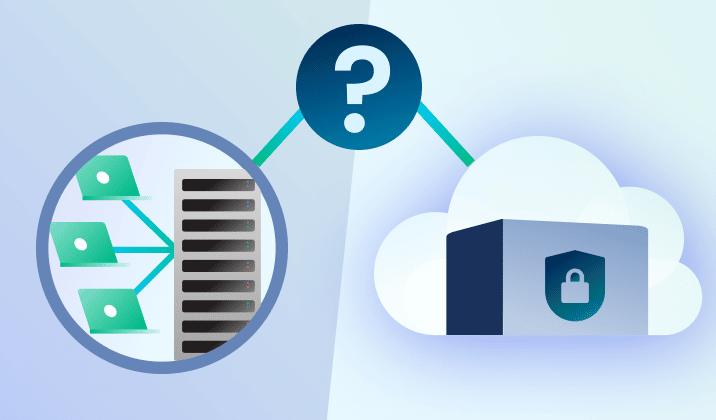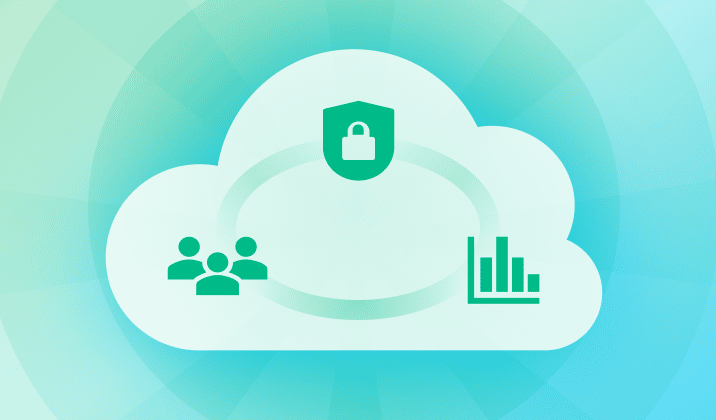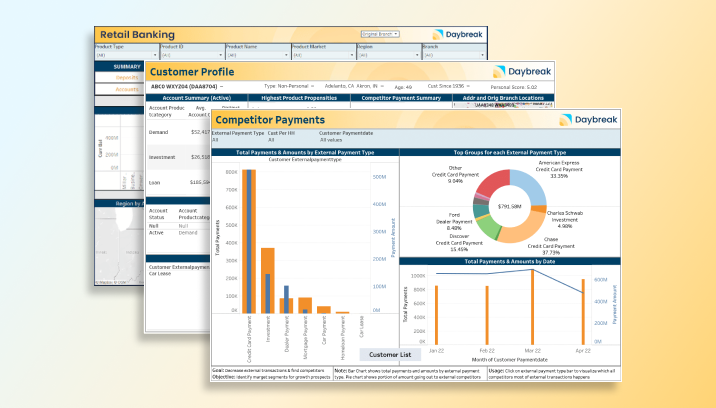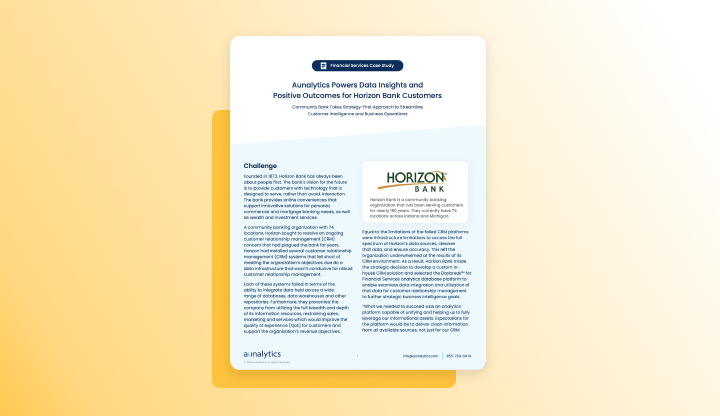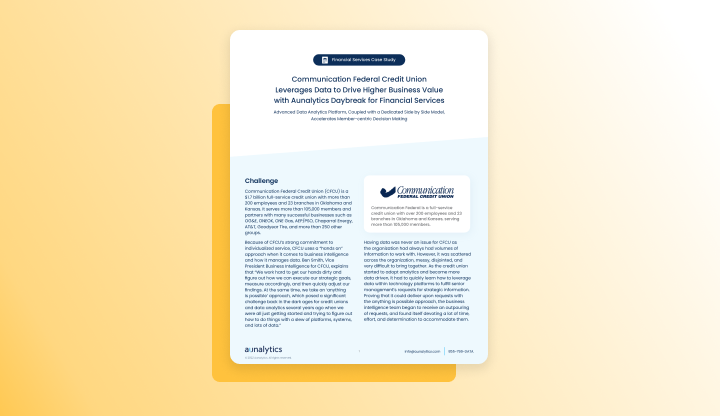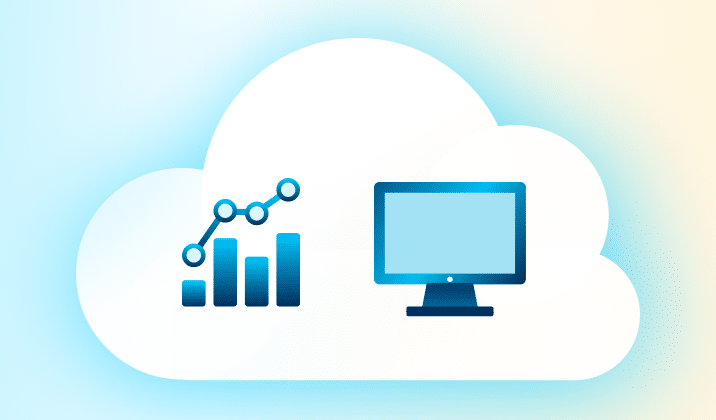Aunalytics Brings Its Portfolio of Managed Services, Enterprise Cloud, and Data Cleansing Solutions to Taste of IT Conference in Ohio
Leading Data Management and Analytics Company to Join More Than 400 IT Professionals for a Day of Networking and Learning
South Bend, IN (November 15, 2022) – Aunalytics, a leading data management and analytics company delivering Insights-as-a-Service for mid-market businesses, will feature its managed services, enterprise cloud, and data cleansing portfolio at the Taste of IT Conference on November 16, 2022. The one-day event, which will be attended by more than 400 IT professionals, will be held at the Sinclair Conference Center in Dayton, Ohio.
Aunalytics provides IT and security expertise to mid-market businesses in the areas of financial services, healthcare, manufacturing and professional services. The company’s Secure Managed Services offering combines mission critical IT services leveraging zero-trust end-to-end security to ensure data is protected regardless of a user’s location. Aunalytics provides managed components that offer stability and security, and its next-generation managed services offering is powered by a data platform that provides data-driven IT answers and embedded security that focuses on people and access.
The full suite of managed IT and integrated security services empowers businesses with a complete, all-encompassing approach that includes 24/7/365 monitoring and management, a synchronized network security platform, workstation and server patching, internet protection, email filtering and security, Office 365 management and security, multi-factor authentication, data and device encryption management, and security awareness training.
The company delivers advanced security for defending against modern threats through a team of engineers and analysts with expert skills and toolsets and, in regulated industries, Aunalytics provides the additional technology and controls required to manage risk. Its team of experts is dedicated to analyzing ever-changing rules and regulations and helping users to create processes and policies for data protection and meet compliance requirements within those industries that are regulated.
Aunalytics’ Enterprise Cloud offering is comprised of infrastructure solutions that provide a highly redundant and scalable platform for hosting servers, data, analytics and applications at any performance level. With the Aunalytics® Cloud Storage and Compute solution, users are assured the highest levels of security, accessibility, expertise, scalability, and savings. Aunalytics’ data centers, located in Northern Indiana and Southwest Michigan, meet the most rigorous standards for security, weather protection, temperature and humidity controls, fire suppression and more.
As data continues to expand exponentially, the challenge of data cleansing is rapidly becoming more difficult, as well as expensive. Aunalytics’ Aunsight™ Golden Record turns siloed data from disparate systems into a single source of truth across the organization. Powered with data accuracy, the cloud-native platform cleanses data to reduce errors, and Golden Record as a Service matches and merges data together into a single source of accurate business information, giving users access to consistent, trusted data across the organization in real-time. With this self-service offering, users can unify all their data to ensure enterprise-wide consistency and better decision making.
“IT executives want practical, real-world knowledge about business changing technology and management solutions that are absolutely critical to drive their businesses forward,” said Robert Lizotte, Local Market Leader, Columbus Region, Aunalytics. “As digital transformation continues to be a high priority for many organizations, our portfolio of managed services, enterprise cloud, and data cleansing solutions provides the tools they need to accelerate their digital transformation journeys. We look forward to participating at a Taste of IT and demonstrating how Aunalytics can help IT professionals advance their business success.”
Tweet this: .@Aunalytics Brings Its Portfolio of Managed Services, Enterprise Cloud, and Data Cleansing Solutions to Taste of IT Conference in Ohio #ToIT22 #Datamanagement #Informationtechnology #Managedservices #Enterprisecloud #Datacleansing #Dataplatform #Dataintegration #Dataaccuracy #Digitaltransformation #ITsecurity #Securitytechnology
About Aunalytics
Aunalytics is a leading data management and analytics company delivering Insights-as-a-Service for mid-sized businesses and enterprises. Selected for the prestigious Inc. 5000 list for two consecutive years as one of the nation’s fastest growing companies, Aunalytics offers managed IT services and managed analytics services, private cloud services, and a private cloud-native data platform for data management and analytics. Aunalytics’ data management platform is built for universal data access, advanced analytics and AI – unifying distributed data silos into a single source of truth for highly accurate, actionable business information. Its DaybreakTM industry intelligent data mart combined with the power of the Aunalytics data platform provides industry-specific data models with built-in queries and AI for accurate mission-critical insights. To solve the talent gap that so many mid-sized businesses and enterprises located in secondary markets face, Aunalytics’ side-by-side digital transformation model provides the technical talent needed for data management and analytics success in addition to its innovative technologies and tools. To learn more contact us at +1 855-799-DATA or visit Aunalytics at https://www.aunalytics.com or on Twitter and LinkedIn.
PR Contact:
Denise Nelson
The Ventana Group for Aunalytics
(925) 858-5198
dnelson@theventanagroup.com
Cloud or On-Prem Servers—Which Is Better for Your Company?
Every organization needs to manage its data to get its desired business outcomes. For a company to access its data and use it in day-to-day operations, dashboards, reporting, and data analytics, it either needs a cloud or on-premises solution to facilitate compute, storage, and data management strategies.
What’s The Difference Between The Cloud And On-Premises Data Storage?
An on-premises data server is hardware that you maintain on your company’s premises for storing, processing, and accessing information through your organization’s networks. An in-house IT department is needed to maintain, turn over/replace, and upgrade the hardware, keep it stable and operational, and secure it.
A cloud storage solution run by an expert and backed by a cutting-edge data center provides the same functions as an on-premises server and more. It does not exist on your company’s premises and the data on it is accessed through the internet. All updates and maintenance tasks are performed by the cloud provider, who owns and operates its own hyper-secure data centers to safeguard your data in case of failure, cyberattack, or outage. Like on-premises servers, access to cloud data can be set by administrators to be permission-based to allow access only by authorized personnel.
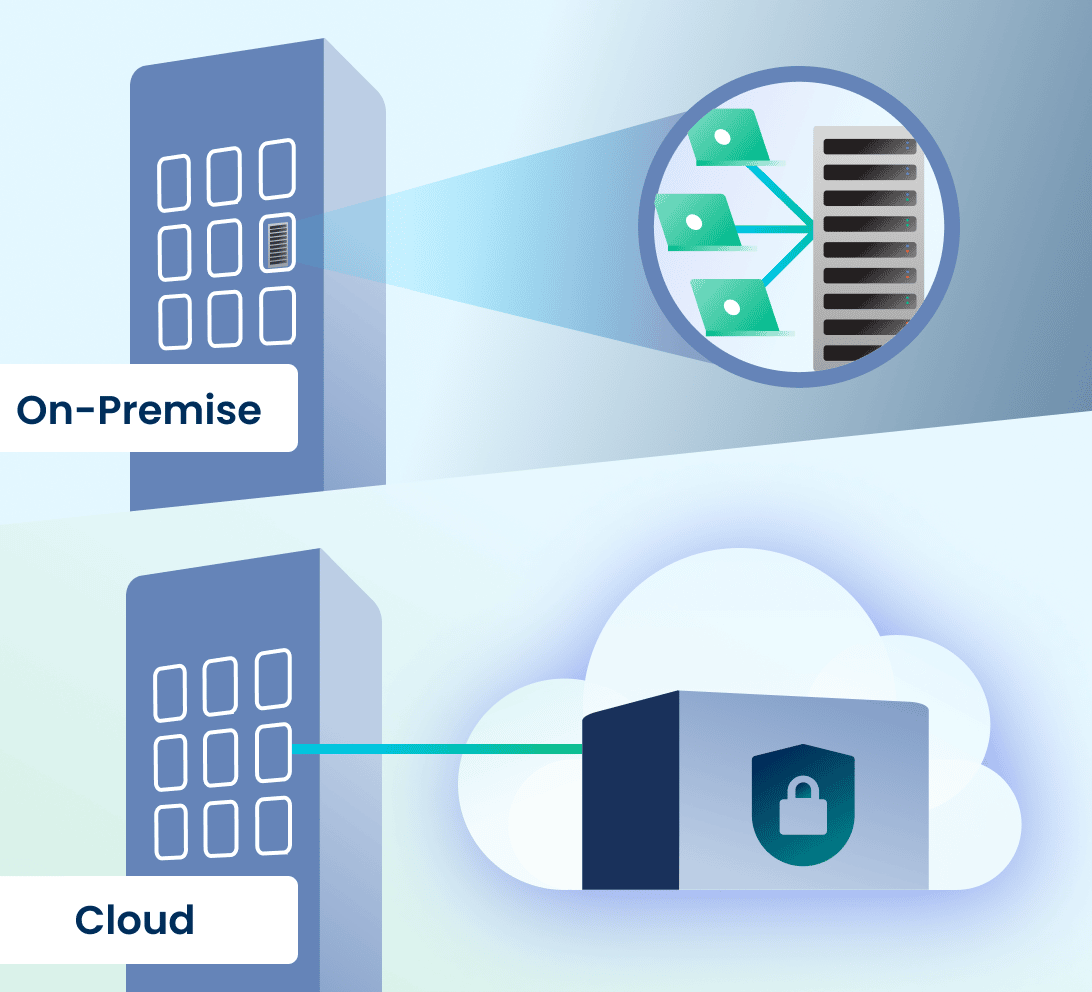
On-Premises vs. Cloud—Which Option Best Suits Modern Business Needs?
There are more factors when choosing between using a cloud computing solution or keeping servers on-premises, including customizability and scalability, security concerns, and the budget for your organization’s data management strategy. While on-premises data servers regularly require hardware upgrades in your physical locations to expand alongside your business’s growing needs, a cloud storage and computing solution with access to highly advanced data centers is scalable based upon your workload. Unlike an on-premises server that can take a lot of time and money to set up and ready for operation, cloud service providers ensure you can access your cloud for computing and storage needs almost instantly.
In some mid-sized companies, server rooms tend to be used for multiple purposes, which means that they are sometimes unlocked, unsecured, and allow for unauthorized access that compromises data security. Many mid-sized companies do not have 24/7/365 monitoring of their server rooms, specialized climate controls needed for a data center, and do not consistently deploy or regularly schedule hardware upgrades to keep the systems reliable before something goes down.
One mid-market employee shares the story of a server closet that her company had in a previous workplace. For starters, it could be accessed by nearly every employee of the company. She recounted that the IT department placed portable dehumidifiers in the room to keep moisture down. The IT department’s regular practice was to empty the server closet dehumidifiers in the office’s kitchen sink. Unfortunately, a new IT employee happened to trip while carrying one of the dehumidifiers and spilled water all over the server room. Every employee of the company was affected—they found out that the work they had done since the last backup, which happened to be 5 days ago, had disappeared. Even worse, their servers were down for several days after the incident, further impacting their daily business operations.
Although in the past, people feared that cloud would not be secure, or a company would lose control over its data—cloud has proven to be more secure than on-premises hardware. First, cloud vendors host their own data centers and because this is their main business, they have cutting-edge climate control environments to protect their clients’ data. Cloud vendors adhere to frequent hardware replacement turn-over schedules to keep uptime maximized and cloud operations state-of-the-art. Cloud vendors monitor their data centers 24/7/365, are security experts, and have strict controls in place in order to service clients in highly regulated industries with rigorous data security needs. For most mid-sized businesses, it is more cost effective to rely upon the expertise of a cloud vendor for data security and uptime than to host and maintain its own servers, stay on top of the latest security threats, and staff its data center (or data closet) for monitoring to prevent downtime and security breaches.
Large enterprises often can afford to build their own data centers providing them an alternative to an external cloud provider. However, this is incredibly expensive and can set organizations back by USD $10-25 million on yearly setup and operation costs. This infrastructure also takes a lot of time to be implemented and in today’s fast-paced business environment, this might not be entirely acceptable for decision-makers.
Yet, even for enterprises, on-premises solutions no longer make the most sense. Most modern business applications are cloud-native. Cutting-edge data analytics solutions are cloud-native and connect and integrate data sources using cloud technologies. Clouds are better suited for analytics than on-premises hardware, due to scalability and ability to absorb compute spikes (instead of having to invest in hardware with capacity for compute spikes as machine learning algorithms converge—which leads to excess capacity at other times).
According to Insights for Professionals, 63% of senior IT leaders and company executives who were surveyed expected to invest in cloud infrastructure-as-a-service in 2022. Considering the state of on-premises servers, which are becoming an obsolete technology that require an IT department to keep a constant eye on it, cloud technology is a natural progression in infrastructure for better data management. Gartner reports by 2025 almost 85% of companies will have moved to a cloud-first approach. Cloud technology has now evolved to a point where it provides better stability and security at a more economical price than on-premises solutions.
Mid-Market Company Considerations
Many organizations are operating in hybrid and multi-cloud environments. This means that they have some data in on-site servers, some data in cloud based line of business applications (relying on the application provider for data storage in whichever cloud the application vendor uses for its product), and many have some data in a public cloud.
However, mid-market companies have added considerations when choosing a cloud solution. Most public cloud service providers do not offer data management services. You need to do this yourself. Yet, mid-market companies often do not have this expert talent in-house. For success, mid-market companies need a cloud hyper-scaler that also provides data engineering services to build data connectors and pipelines, warehouses, data lakes, and the like. This skill set is different from a typical IT employee. Hyper-scalers—who can help organizations with data management, transform data from disparate sources into a decision and analytics-ready status, and bring transactional data into the forefront using a cost-effective cloud solution—tend to be private cloud vendors. For this reason, private cloud solutions make more sense than public cloud for mid-sized organizations.

A side-by-side partnership with an experienced cloud-native data platform company will have a measurable and positive impact on mid-market company data management strategies, with built-in access to technical resources and experts, so that your company does not need to hire new FTEs to support data management. Rely on the data management companies for data management so that your company can focus on your main line of business.
Aunalytics’ high performance private cloud provides a highly redundant and scalable platform for hosting servers, data, analytics, and applications at any performance level. Aunalytics delivers data management in a side-by-side service model, bringing companies the technology and the talent needed for data management success. To learn more about our Enterprise Cloud solution, click here.
Aunalytics Highlights Security Priorities as Cybersecurity Awareness Month Concludes
Company Recommends Cybersecurity Solutions to Better Protect Organizations Against High-Risk Cyber Attacks
South Bend, IN (October 28, 2022) – Aunalytics, a leading data management and analytics company delivering managed IT and data platform services for mid-sized and enterprise businesses, today highlighted top security priorities to follow when reinforcing defensive security strategies against malicious cyber threats. The guidance is provided as Cybersecurity Awareness Month comes to a close in October, after a month of focus on the subject.
According to Check Point Research (CPR), “2022 began with a massive exploitation of one of the most serious vulnerabilities on the internet, the Apache log4j, and continued with full blown cyber warfare from the Russia-Ukraine war. The second quarter of 2022 saw an all-time peak, where global cyber-attacks increased by 32%, compared to Q2 2021. The average weekly attacks per organization worldwide reached a peak of 1.2K attacks.”
In response to the rising number of attacks, Aunalytics is providing guidance and solutions to strengthen, educate and defend business IT systems and data from attack. These include having a comprehensive Vulnerability Management (VM) solution, Security Awareness Training, and beginning a Security Maturity Journey – all backed by Aunalytics’ expert cybersecurity team.
Aunalytics cybersecurity solutions experts recommend the following:
- Vulnerability Management (VM) – Replaces manual efforts to protect the network from bad actors using high quality equipment and tools that are typically limited to enterprise organizations. Without a VM solution in place, it is exceedingly difficult to find individuals who have slipped into the network. A VM solution is overseen by security professionals and discovers devices on a network, determines if they are vulnerable and fixes any underlying issues, while concurrently protecting the network as fixes are implemented.
- Security Awareness Training – Security management and training are crucial for businesses to avoid digital disasters. Security awareness training is necessary to educate employees about the digital dangers in their environment and how to properly deal with them. Aunalytics provides expert knowledge and toolsets that employees need in order to better protect the organization.
- Security Maturity Journey – If system security is not keeping up with the rapidly changing threat landscape, it will become obsolete and more vulnerable to bad actors. Security maturity means adapting and improving security as the environment changes and grows. It means taking strategic actions like deploying active defenses with the help of security intelligence from multiple sources. Businesses can evolve from a legacy security state to security maturity with the help of a trusted partner.
The growing threat of cybercrime is a risk to any organization connected to the Internet. Attacks can arrive in forms that include phishing, spear phishing, ransomware attacks, zero-day attacks, known vulnerability exploits, sensitive data breaches, brute-force attacks and more. Secure Managed Services by Aunalytics offers peace of mind in knowing that IT environments are monitored and managed at all times with the goal of eliminating the risk of data exfiltration or infrastructure downtime.
“End-to-end protection requires actions and defenses that consider the entirety of systems and software throughout an organization. It also means educating employees so they are ‘security aware’ to help reduce the number of threats that may enter through vulnerable endpoints,” said Steven Burdick, VP, Sales, Cloud & Managed Services. “Aunalytics protects organizations on their security journey, deploying a defensive cybersecurity framework that provides the technology and expertise for better security posture.”
About Aunalytics
Aunalytics is a leading data management and analytics company delivering Insights-as-a-Service for mid-sized businesses and enterprises. Selected for the prestigious Inc. 5000 list for two consecutive years as one of the nation’s fastest growing companies, Aunalytics offers managed IT services and managed analytics services, private cloud services, and a private cloud-native data platform for data management and analytics. The platform is built for universal data access, advanced analytics and AI — unifying distributed data silos into a single source of truth for highly accurate, actionable business information. Its DaybreakTM industry intelligent data mart combined with the power of the Aunalytics data platform provides industry-specific data models with built-in queries and AI for accurate mission-critical insights. To solve the talent gap that so many mid-sized businesses and enterprises located in secondary markets face, through its side-by-side digital transformation model, Aunalytics provides the technical talent needed for data management and analytics success in addition to its innovative technologies and tools. To learn more contact us at +1 855-799-DATA or visit Aunalytics at https://www.aunalytics.com or on Twitter and LinkedIn.
PR Contact:
Denise Nelson
The Ventana Group for Aunalytics
(925) 858-5198
dnelson@theventanagroup.com
Does Your Mid-Market Firm Have the Right Talent to Maximize Its Data Tech Investments?
Does Your Mid-Market Firm Have the Right Talent to Maximize Its Data Tech Investments?
Investing in digital transformation technologies can be a waste of money if your company forgets one important point. That point is, no matter how cutting edge the tech or tool may be, people are needed with specific technical expertise in order to derive true business value from these investments.
Unlike large enterprises, mid-market companies often try to find this expertise in their IT manager, hoping a jack-of-all-trades approach will take care of it. This is an unfortunate mistake, since it would require the IT manager to have unusual command over a long laundry list of duties, from data integration, ingestion, and preparation to data security, regulatory compliance, data science, and building pipelines of data ready for executive reporting from multiple cloud and on-premises environments. This is not just a tall order for a mid-market IT manager to pull off, but likely an impossible one.


To read more, please fill out the form below:
Featured Content
2022 Technology First Taste of IT Conference
2022 Technology First Taste of IT Conference
Sinclair Conference Center, Dayton, OH
Aunalytics to Attend Technology First's 2022 Taste of IT Conference as a Gold Sponsor
Aunalytics is proud to be a Gold Sponsor, and excited to join over 400 IT professionals at the Technology First Taste of IT Conference on in Dayton, Ohio. Aunalytics provides a wide variety of managed IT and security solutions, such as our Secure Managed Services offering which combines mission critical IT services leveraging zero trust end-to-end security to ensure people and data are protected regardless of location. In addition, our Advanced Security solution gives organizations access to cutting-edge technology and expertise of Aunalytics professionals to prevent and mitigate cyberattacks.
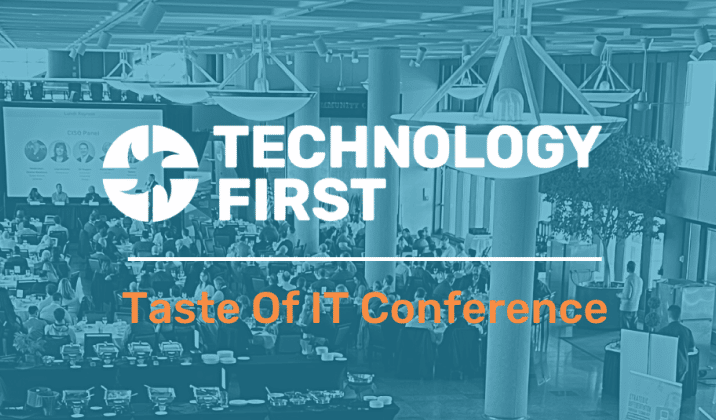
Does Your Mid-Market Firm Have the Right Talent to Maximize Its Data Tech Investments?
Does Your Mid-Market Firm Have the Right Talent to Maximize Its Data Tech Investments?
Investing in digital transformation technologies can be a waste of money if your company forgets one important point. That point is, no matter how cutting edge the tech or tool may be, people are needed with specific technical expertise in order to derive true business value from these investments.
Unlike large enterprises, mid-market companies often try to find this expertise in their IT manager, hoping a jack-of-all-trades approach will take care of it. This is an unfortunate mistake, since it would require the IT manager to have unusual command over a long laundry list of duties, from data integration, ingestion, and preparation to data security, regulatory compliance, data science, and building pipelines of data ready for executive reporting from multiple cloud and on-premises environments. This is not just a tall order for a mid-market IT manager to pull off, but likely an impossible one.

At the same time, it’s unreasonable to expect that most mid-market firms can hire an entire division of data experts—who each need to be highly compensated—in order to achieve the organization’s digital transformation goals. Even if a mid-market player could afford it—which is unlikely to make economic sense—these talent resources are scarce and in high demand.
If you’re still wondering whether your IT manager’s skill set, leveraged by your in-house IT technicians, can properly run the gamut required to achieve value from your data technology investments, consider that the person in this position would need the ability to master a wide range of skill sets, from cloud architecture, database engineering, and master data management to data quality, data profiling, and data cleansing. More specifically, your IT manager would need to take on five additional specialized roles for technical talent that are critical for achieving value from data technology investments.
These roles are:
Chief Data Officer/Chief Digital Officer
A chief data officer (CDO) is focused on—you got it—data. Most mid-market companies understandably don’t have a CDO, which means they don’t have anyone who assures regulatory compliance for data handling while managing and exploiting information assets, reducing uncertainty and risk, and applying data and analytics to drive cost optimization and revenue objectives. For IT managers to fulfill a CDO role, they’d have to be equipped to bring a global perspective to company data, help their organization gain competitive advantage over peers, and manage data and analytics. They’d also need the ability to secure data, transform it into valuable business information, lead digital transformation initiatives, and use data for growth and operational efficiency.
Cloud Engineer
The primary job of a cloud engineer is to keep cloud data centers operational and secure for ecosystem users to be able to store and access their data. Cloud engineers are experts in minimizing downtime, managing access to data, managing compute and storage, and setting up cloud architectures for clients, tenants, and containers. They also monitor data center hardware, servers, networks, and communications systems for operational continuity and efficiency.
Data Security Expert
Mid-market firms also need a way to channel the talents of a data security expert, CISO, or cybersecurity director to ensure cyber-security for the company’s data. Data security experts must keep current on emerging threats while executing data security strategies to fend off and remediate attacks. This involves a wide range of duties, including working closely with the IT team to run the company’s Security Operations Center (SOC), constantly monitoring servers, networks, and workstations for security threats, and staying up to date on the changing compliance laws and regulations for the business, to name a few. While larger IT teams have bandwidth to fill cybersecurity needs inhouse, many midmarket IT teams do not have capacity for the 24/7/365 monitoring and security edits needed to thwart attacks, let alone bandwidth for executing on mitigation and response strategies needed to overcome them.
Data Engineer
A data engineer’s primary job is to prepare data for analysis or operational uses, which involves integrating data from different sources, as well as implementing and executing data profiling, cleansing, transforming, and normalizing data. Data engineers also work with data in motion and use master data management to ensure data consistency across an organization. Finally, a data engineer is your go-to technical resource for database construction and management, helping to optimize the company’s data ecosystem.
Data Scientist
It should be clear now why a mid-market IT manager should not be expected to take on these additional professional roles, but in case there’s any doubt, keep in mind that a data scientist is also needed. Data scientists develop algorithms and leverage deep learning models to analyze data with artificial intelligence and machine learning. The data scientist creates the “brain” of the data analytics solution to position it for providing accurate answers based on business information. Data scientists also mine data to find opportunities for business growth and efficiency. Ideally, the data scientist uses tools that enable non-technical business users to query data sets without having to write SQL or other code.
Master of One
If you’ve correctly determined that your mid-market IT department does not have enough time to absorb these data roles into their regular duties of keeping your company systems stable and responding to help desk tickets from your team, don’t despair. There’s a viable solution for mid-market businesses with this dilemma: they can partner with data experts who provide a side-by-side model coupling technology with talent. This allows the mid-market to efficiently compete, leveraging the necessary skillsets to achieve digital transformation success.
What does successful mid-market digital transformation require? The key is to have a cloud-based data center, a cloud native data management platform, and cloud native analytics, thus shifting the burden of procuring and maintaining the infrastructure to a third-party vendor in the data industry. Instead of attempting to reinvent the wheel in house, mid-market players should ensure they’re partnered with the right infrastructure to maximize the data-center capabilities, and data storage and management, for effective digital transformation.
Mid-market firms can gain the benefits of working with a wide range of experts including cloud engineers, data engineers, security experts, data scientists, and other highly skilled technical resources if they establish a partnership with a data platform company. By opting for this type of side-by-side expert help, the mid-market can achieve true business value—without needing to hire an entire data team.
Bridging the Mid-Market Talent Gap for Digital Transformation
Bridging the Mid-Market Talent Gap for Digital Transformation
To achieve business value from data technology investments, mid-market companies need the right technical expertise and talent. Yet many mid-market firms push this onto their IT manager, assuming that since it is technology related, IT has it. This is a mistake because most IT departments do not have time for data analytics. They are busy full time keeping company systems stable and secure, and providing support to your team members. This by necessity results in IT deprioritizing data queries over crucial cybersecurity attack prevention. Business analysts and executives get frustrated waiting for data query results, and the data is stale or the business opportunity has passed by the time query results are in.

But even if your IT team had time for it, it still is a mistake to rely on traditional technology administrators for data analytics success. This is unless your IT department has expertise across a wide range of skill sets, from cloud architecture, database engineering, master data management, data quality, data profiling, and data cleansing. What’s more, your IT manager would need to have command over data integration, data ingestion, data preparation, data security, regulatory compliance, data science, and building pipelines of data ready for executive reporting from multiple cloud and on premises environments.
When you read this laundry list of needs, it becomes clear that most mid-market IT departments lack the specialized experts needed to derive business value from their data. Unlike larger enterprises that have the resources to hire skilled staff for these roles, the mid midsize organization requires another option that provides access to the right tools, resources, and support. One that integrates, enriches and is trained in utilizing AI, machine learning, and predictive analytics to achieve more useful results.

To read more, please fill out the form below:
Bridging the Mid-Market Talent Gap for Digital Transformation
Bridging the Mid-Market Talent Gap for Digital Transformation
To achieve business value from data technology investments, mid-market companies need the right technical expertise and talent. Yet many mid-market firms push this onto their IT manager, assuming that since it is technology related, IT has it. This is a mistake because most IT departments do not have time for data analytics. They are busy full time keeping company systems stable and secure, and providing support to your team members. This by necessity results in IT deprioritizing data queries over crucial cybersecurity attack prevention. Business analysts and executives get frustrated waiting for data query results, and the data is stale or the business opportunity has passed by the time query results are in.

But even if your IT team had time for it, it still is a mistake to rely on traditional technology administrators for data analytics success. This is unless your IT department has expertise across a wide range of skill sets, from cloud architecture, database engineering, master data management, data quality, data profiling, and data cleansing. What’s more, your IT manager would need to have command over data integration, data ingestion, data preparation, data security, regulatory compliance, data science, and building pipelines of data ready for executive reporting from multiple cloud and on premises environments.
When you read this laundry list of needs, it becomes clear that most mid-market IT departments lack the specialized experts needed to derive business value from their data. Unlike larger enterprises that have the resources to hire skilled staff for these roles, the midsize organization requires another option that provides access to the right tools, resources, and support. One that integrates, enriches and is trained in utilizing AI, machine learning, and predictive analytics to achieve more useful results.
Achieving Digital Transformation
Digital transformation has been defined by some as the integration of digital technology into all areas of a business, fundamentally changing how employees operate and deliver value to customers. Some of the challenges midsize businesses have with building an internal team to initiate this concept are employee pushback, lack of expertise to lead digitization initiatives, improper organizational structure, the absence of a digitization strategy and limited budget. As an alternative to building an internal operation, a more efficient way for mid-market businesses is to leverage the skillsets of experts by partnering with a consolidated group of experts, leveraging a side-by-side model that couples technology with talent. Look for solution providers that offer the following:
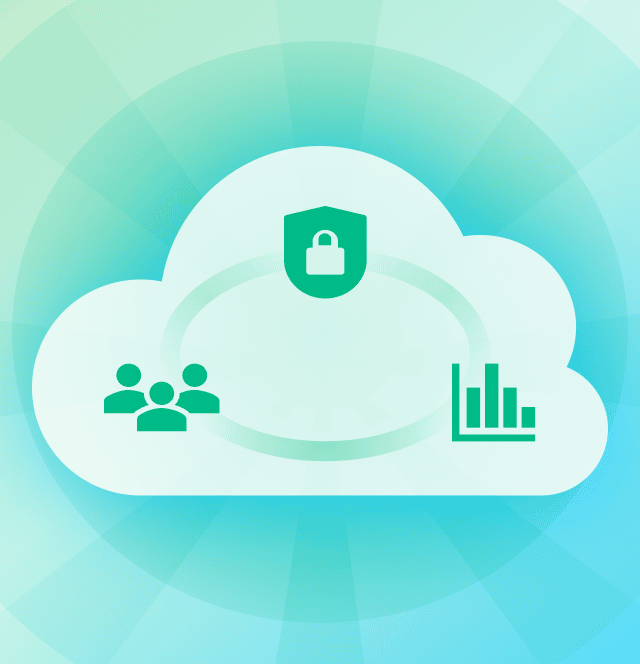
- Powerful cloud data centers paired with engineers skilled in architecting cloud-based applications and processes that better serve critical business requirements. These data centers are optimized for true multi-tenancy, built on seamlessly integrated hardware and software, offer business-driven configurability, world-class security and performant systems.
- Active Monitoring and Thoroughly Integrated Security. Monitoring and security should be pervasive across system infrastructure to defend against cyberattacks and provide remediation when required. Business customers will also expect full-time monitoring and on-demand help desk to address unexpected events. The data management platform underpinning applications should be monitored by experienced data engineers with success in building data warehouses, data lakes, and data pipes. They should also be able to integrate, cleanse, and transform data into decision-ready and analytics-ready business information.
- High ROI Business Insights that Drive Results. Data analytics investments need to provide real business value by giving actionable insights and finding opportunities within your data. With this in mind, data analytics should include access to data scientists and business analysts versed in your industry. These experts should be equipped to design AI-powered algorithms that answer the most pressing questions based on real-world business challenges.
Mid-Market Data Transformation for Enterprise-Class Results
Ensuring the right mix of hardware, software and resulting services are available to maximize the data center capabilities—and their ability to manage and protect data—is crucial to effective mid-market digital transformation. To compete and drive value, the cloud data center provider must deliver at all levels, with customizable business intelligence solutions powered by an effective data management platform that is secure and compliant. Successful mid-market digital transformation thus requires a shift of responsibilities for infrastructure procurement and maintenance to a third-party provider backed by experienced staff and best-in-class infrastructure.
When implementing a digital transformation project, your company gains from the many benefits this brings, such as a higher return on your IT investment, increased employee and customer experience, and greater business agility. This is further enhanced by leveraging experienced cloud engineers, data engineers, security experts, data scientists, and other highly skilled technical resources—achieving true business value from the investment. And by partnering with experts, your company’s time, resources, and innovation can be focused on its core competencies.
Top 3 Actions for CIOs to Take Now in a Recession Economy
Top 3 Actions for CIOs to Take Now in a Recession Economy
The current economy poses a triple threat for business: persistent high inflation; scarce expensive talent; and global supply constraints. However, there are 3 actions CIOs should take to play offense to emerge from a recession on top.
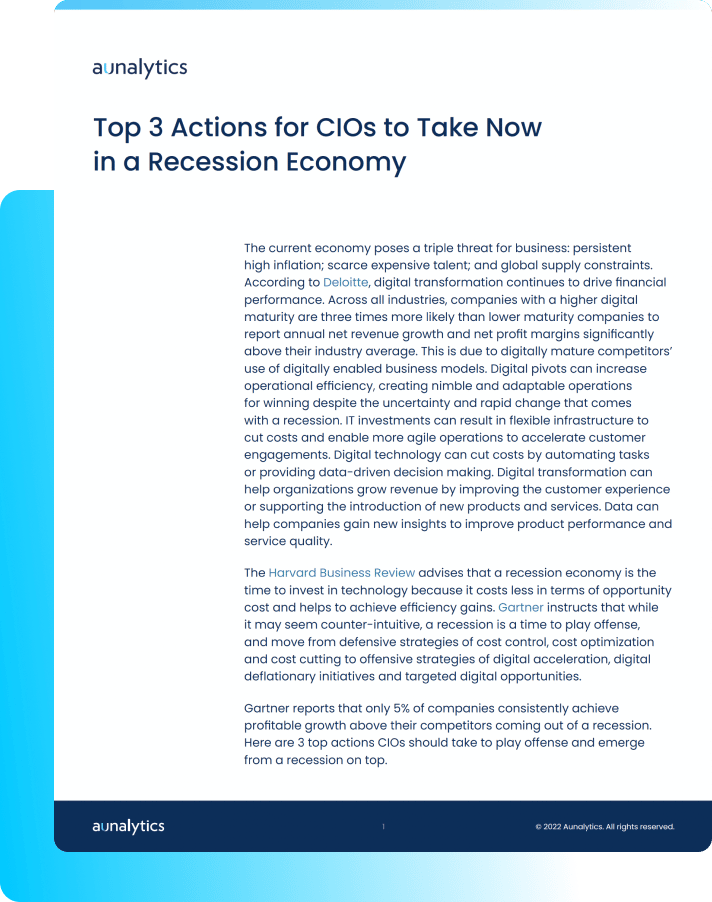
Fill out the form below to receive a link to the article.
Aunalytics is a data platform company. We deliver insights as a service to answer your most important IT and business questions.
Aunalytics Security Operations Manager Rob Bradford to Deliver a Talk on the Cost of Skimping on Security in 2022 at BankTech Conference, Attended by Illinois, Indiana, Michigan, and Ohio Bankers
Leading Data Management and Analytics Company Will Feature Its Managed Services Solutions for Improving Operational Efficiencies and Reducing the Risks Associated with Cyber Attacks at Two Banking Events in October
South Bend, IN (September 29, 2022) - Aunalytics, a leading data management and analytics company delivering Insights-as-a-Service for mid-market businesses, announced today that Rob Bradford, Security Operations Manager for Aunalytics, will discuss The Cost of Skimping on Security in 2022 at the BankTech Conference on October 6. The company will also showcase its managed services, enterprise cloud, and data cleansing portfolio at the conference, in addition to the Indiana Bankers Association’s Security & Technology Conference, October 4-6.
Cyber-attacks are an increasing concern, especially for financial services firms which may experience up to 300 times more cyber attacks per year than other firms. Cyber criminals continue to double down efforts to breach financial data, compromise accounts, and profit from this industry with increasingly sophisticated attacks and campaigns. It is more critical than ever that banks work with the right IT services providers who have the security expertise, up-to-date knowledge of industry developments, and comprehensive tools to maintain a strong defense against cyber threats.
Aunalytics provides IT and security expertise to mid-market businesses in the areas of financial services, healthcare, manufacturing, professional services, and cities and local government. The company’s Secure Managed Services offering combines mission critical IT services leveraging zero-trust, end-to-end security to ensure data is protected regardless of a user’s location. Aunalytics provides managed components that offer stability and security, and its next-generation managed services offering is powered by a data platform that provides data-driven IT answers and embedded security that focuses on people and access.
The full suite of managed IT and integrated security services empowers businesses with a complete, all-encompassing approach that includes 24/7/365 monitoring and management, a synchronized network security platform, workstation and server patching, internet protection, email filtering and security, Office 365 management and security, multi-factor authentication, data and device encryption management, and security awareness training.
The company delivers advanced security for defending against modern threats through a team of engineers and analysts with expert skills and toolsets and, in regulated industries, Aunalytics provides the additional technology and controls required to manage risk. Its team of experts is dedicated to analyzing ever-changing rules and regulations and helping users to create processes and policies for data protection and meet compliance requirements within those industries that are regulated.
Aunalytics’ Enterprise Cloud offering is comprised of infrastructure solutions that provide a highly redundant and scalable platform for hosting servers, data, analytics and applications at any performance level. With the Aunalytics® Cloud Storage and Compute solution, users are assured the highest levels of security, accessibility, expertise, scalability, and savings. Aunalytics’ data centers, located in Northern Indiana and Southwest Michigan, meet the most rigorous compliance standards.
“Cyber security continues to be an important concern for banks and other financial institutions while cyber criminals are increasingly adept at executing attack campaigns,” said Steve Burdick, Vice President Sales, Cloud & Managed Services Aunalytics. “Working with a managed services provider who has the expertise to help with such things as vulnerability testing, proactive threat hunting, and ongoing monitoring helps reduce the burden on internal IT resources. Aunalytics’ full suite of managed IT and integrated security services solutions provides the tools and people resources mid-market banks need to adequately improve their security postures and maintain the highest levels of IT security to thwart cyber-attacks and reduce risk.”
Tweet this: .@Aunalytics Security Operations Manager Rob Bradford to Deliver a Talk on The Cost of Skimping on Security in 2022 at BankTech Conference, Attended by Illinois, Indiana, Michigan, and Ohio Bankers #Informationtechnology #Managedservices #Enterprisecloud #Datacleansing #Dataplatform #Dataintegration #Dataaccuracy #Digitaltransformation #ITsecurity #Securitytechnology #Banking #Midmarketbanks #Creditunions
About Aunalytics
Aunalytics is a leading data management and analytics company delivering Insights-as-a-Service for mid-sized businesses and enterprises. Selected for the prestigious Inc. 5000 list for two consecutive years as one of the nation’s fastest growing companies, Aunalytics offers managed IT services and managed analytics services, private cloud services, and a private cloud-native data platform for data management and analytics. The platform is built for universal data access, advanced analytics and AI – unifying distributed data silos into a single source of truth for highly accurate, actionable business information. Its DaybreakTM industry intelligent data mart combined with the power of the Aunalytics data platform provides industry-specific data models with built-in queries and AI for accurate mission-critical insights. To solve the talent gap that so many mid-sized businesses and enterprises located in secondary markets face, Aunalytics’ side-by-side digital transformation model provides the technical talent needed for data management and analytics success in addition to its innovative technologies and tools. To learn more contact us at +1 855-799-DATA or visit Aunalytics at https://www.aunalytics.com or on Twitter and LinkedIn.
PR Contact
Denise Nelson
The Ventana Group for Aunalytics
(925) 858-5198
dnelson@theventanagroup.com
